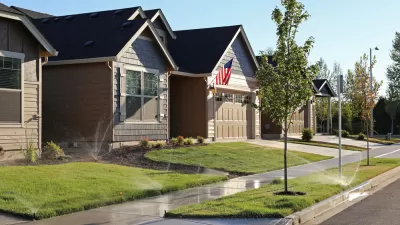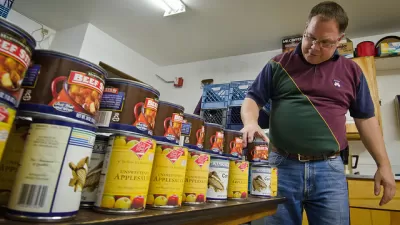"We can’t understand what’s working in America’s cities unless we also look at what’s not working in the vast suburbs that surround them," writes Rebecca Burns.
Rebecca Burns examines the poverty in suburban Atlanta, especially places in Cobb County. Cobb County, according to Burns, "for decades has been synonymous with Atlanta’s suburban affluence but now finds itself facing an epidemic of the very poverty its residents were determined to avoid when they moved out of the city."
"Long considered the epitome of red-state suburban comfort, a quintessentially middle-class kind of place where the median income is $65,000 and people pride themselves on owning their own homes, Cobb County now has other superlatives attached to its name. Between 2000 and 2010, the county’s poverty rate doubled to 12 percent. Just last month, the Urban Institute reported that of all counties in the United States, Cobb is where low-income people have the least chance of finding affordable places to live."
Burns describes Cobb County as the "flip side of the national urban boom," which is to say that it's not a problem unique to Cobb County. "If the old story of poverty in America was crumbling inner cities and drug-addled housing projects, the new story is increasingly one of downscale strip malls and long bus rides in search of ever-scarcer jobs."
The article is a thorough long read, during which Burns examines many examples and personal stories from the Cobb County experience—while also explaining their relevance to suburban locations around the country.
FULL STORY: Sprawled Out in Atlanta

Planetizen Federal Action Tracker
A weekly monitor of how Trump’s orders and actions are impacting planners and planning in America.

Map: Where Senate Republicans Want to Sell Your Public Lands
For public land advocates, the Senate Republicans’ proposal to sell millions of acres of public land in the West is “the biggest fight of their careers.”

Restaurant Patios Were a Pandemic Win — Why Were They so Hard to Keep?
Social distancing requirements and changes in travel patterns prompted cities to pilot new uses for street and sidewalk space. Then it got complicated.

Platform Pilsner: Vancouver Transit Agency Releases... a Beer?
TransLink will receive a portion of every sale of the four-pack.

Toronto Weighs Cheaper Transit, Parking Hikes for Major Events
Special event rates would take effect during large festivals, sports games and concerts to ‘discourage driving, manage congestion and free up space for transit.”

Berlin to Consider Car-Free Zone Larger Than Manhattan
The area bound by the 22-mile Ringbahn would still allow 12 uses of a private automobile per year per person, and several other exemptions.
Urban Design for Planners 1: Software Tools
This six-course series explores essential urban design concepts using open source software and equips planners with the tools they need to participate fully in the urban design process.
Planning for Universal Design
Learn the tools for implementing Universal Design in planning regulations.
Heyer Gruel & Associates PA
JM Goldson LLC
Custer County Colorado
City of Camden Redevelopment Agency
City of Astoria
Transportation Research & Education Center (TREC) at Portland State University
Camden Redevelopment Agency
City of Claremont
Municipality of Princeton (NJ)





























